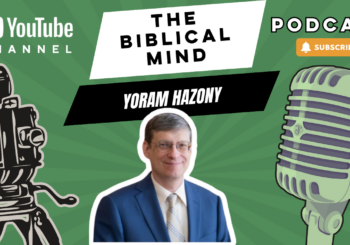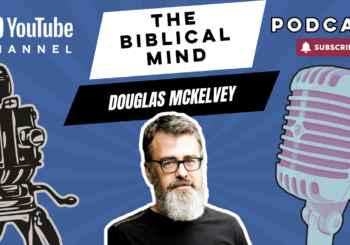Part of the 6 Jewish Thinkers All Christians Should Know series
Rabbi Abraham Joshua Heschel Still Brings Jews and Christians Together
For almost two years, a group of Jewish and Christian young professionals gathered together every two weeks to explore the works of Rabbi Abraham Joshua Heschel in the context of a book club.
Carefully selecting meeting dates around Jewish holidays and Christian feasts, and taking turns bringing kosher snacks to a Catholic student residence, the group—of which I was a member—delved into three books and a couple essays by one of the twentieth century’s greatest Jewish figures.
Enjoying this article? Read more from The Biblical Mind.
Why did we choose to devote our book club to reading Heschel? What is it that made Rabbi Heschel, who died in 1972, relevant and inviting to us today? And why is Heschel a rabbi every Christian should know?
Why Abraham Joshua Heschel Matters
The initiator of our book club, Daniel, is an Indian Catholic who grew up in Brunei. As a minority in both countries, where his neighbors were predominantly Hindu and Muslim, respectively, Daniel was raised in environments in which he got to know people of other faiths. However, a turning point for him came at age 16 when he watched Schindler’s List for the first time and realized that he had next to no context for what it was about. He had never had the opportunity to learn about Jewish history or to meet Jews in real life, and so, when Daniel immigrated to Canada, he resolved to get to know Jews and to explore Jewish history and literature.
Interests converged when Daniel was also educating himself about the Civil Rights Movement and discovered that Rabbi Abraham Joshua Heschel had played an important role. Daniel had seen the striking photo of Rabbi Heschel marching with Martin Luther King, Jr., and he discovered in Heschel, and in Heschel’s reading of Judaism, that a sense of a prophetic witness and a non-violent demand for justice had influenced that movement.
In a 1963 address, Rabbi Heschel declared that “racism is satanism, unmitigated evil” and asked, “Who shall prevent the epidemic of injustice?” In the same speech he said:
The prophet is a person who suffers the harms done to others. Wherever a crime is committed, it is as if the prophet were the victim and the prey. The prophet’s angry words cry. The wrath of God is a lamentation. All prophecy is one great exclamation: God is not indifferent to evil! He is always concerned, He is personally affected by what man does to man. He is a God of pathos.
In everything, Heschel brought to bear not only the history of the Holocaust but also his personal and existential experience of it. He was born in Warsaw in 1907 and made it to New York in 1940. His mother and sisters were murdered in the Holocaust and he never returned to the country of his birth.
In addition to the moral clarity he derived from his study of the Bible, and in particular from his doctoral work that was eventually published as The Prophets, Heschel was also a pioneer in Jewish–Christian relations. Catholic theologian Dr. Eva Fleischner summed up Rabbi Heschel’s contributions to the Catholic Church’s Second Vatican Council, saying, “We have here the extraordinary phenomenon of a religious Jewish thinker, utterly, profoundly Jewish, from a long Hasidic line, who not only reached out to and touched the lives of Christian theologians and two popes, but who influenced the outcome of the Roman Church’s relationship to the Jews through Vatican II’s declaration Nostra Aetate.”
Rabbi Heschel also cultivated a strong friendship with Cardinal Bea, the German Jesuit who is considered the principal architect of the groundbreaking declaration promulgated by Pope Paul VI that formally repudiates antisemitism and insists on the greatness of “the spiritual patrimony common to Christians and Jews.”
It is not an exaggeration to say that the friendships made possible through our Heschel book club are in part the result of these constructive dialogues between the Jewish and Christian thinkers who preceded us. In fact, not only are we ourselves discussing with each other as Jewish and Christian millennials, but we also put our traditions in conversation throughout the book club. It became natural for us, therefore, to weave Rabbi Jonathan Sacks with C.S. Lewis, and Rabbi Joseph Soloveitchik with Pope John Paul II. Where we might have been initially reticent to share from our respective traditions, Heschel gave all of us the confidence to do so.
What Makes Heschel Inviting?
For our first book club meeting, we discussed Heschel’s essay “No Religion is an Island” and invited each participant to say what had motivated him or her to join the group.
A Jewish participant memorably replied, “I’m here because I have a master’s in Jewish Studies and I’ve never read anything by Heschel because he’s outside of my [denominational] tradition.”
Our group convened observant Jews and practicing Christians who take their faith seriously. Skeptics of our book club wondered why we would not prefer to spend our time steeping in our own tradition. But the value was borne out for each of us insofar as we found the discussions to be clarifying and refining of our own traditions in ways that were surprising and edifying.
A Jewish participant named Elisa considers Heschel’s writings timeless. She reflected,
He really contemplates those everyday questions that many of us maybe ask ourselves or think about sometimes but don’t really delve into very much. That creates a really great opportunity for us to go back to the basics because sometimes you need that to remember who you are or where you come from and what you care about. Being able to have these important discussions about what you care about, how you maintain awe in your everyday life or how you keep God in mind when you’re doing mundane things . . . really coming back to that has been strengthening and important for us in our own faiths.
A Ukranian Catholic deacon in the group shared how Rabbi Heschel’s book The Sabbath had transformed his understanding of Sunday. He resolved to experiment with not shopping on Sundays after reading Heschel in an effort to recover the sanctity of Sunday. Meanwhile, a Russian-Israeli-Canadian Jew who has observed Shabbat her whole life expressed surprise that others could have and live a sacred day of rest in a different yet related way to the Jewish sabbath.
The young adults—Jews and Christians—were all unanimous in finding that Heschel’s poetic and illustrative language makes him an inviting and accessible thinker.
As a group, we would have profound, sincere conversations about moments of awe at God’s providence, at God’s grandeur. I found it extraordinary that we young professionals would convene after an ordinary day to discuss: Where do we see the grandeur of God? What has been a moment of awe in the past week? What is it to have reverence for others? What is it to take responsibility as an animating principle into all our spheres of action in the world? These were the kinds of conversations we had through which we would raise very personal and specific examples from our travel, work, and community service.
Rabbi Heschel’s manner of raising questions is imaginative and provocative. For example, he writes, “It is the free man who asks: Why should I be interested in my interests? What are the values I ought to feel in need of serving?”
A single line could capture our imaginations for months—for example: “How should I live the life that I am?” In Who Is Man?, Heschel teaches us that our life is not so much something we have as someone we are. Our lives are a task and, as he says in another place in the same book, “The content of this task we must acquire.”
When Jewish participant Elisa told her friends about the book club and that her favorite book by Heschel is God in Search of Man, one friend queried, “Don’t you mean, ‘Man in Search of God’?” Even Heschel’s titles are provocative and led each of us into meaningful conversations in our day-to-day.
My friends and I found Heschel concrete and practical, significant on both existential and social levels. Though he was ever addressing the issues of his day, Heschel speaks to us because these issues remain very much in our lives now. We have the sense that what he says concerns us.
A Rabbi for Christians
The first word spoken by the first one to recognize the risen Christ is an affectionate greeting of Jesus as rabbi. And while Jesus remains the preeminent rabbi for Christians, more and more Christians are beginning to open their hearts to the wisdom of modern rabbis in our own time. There are a few reasons why Heschel deserves to be among these.
First, this magazine is called “The Biblical Mind” and Heschel’s life and works are permeated with biblical imagination. For Heschel, the task of education is to explain what it means to live as a likeness of God. And for this, he thought, it is not enough to rely on texts alone. He said, “What we need more than anything else is not textbooks but textpeople. It is the personality of the teacher which is the text the pupils read; the text that they will not forget.”
Indeed we are in need of ethical exemplars—of “textpeople” who lived and who live with gratitude, responsibility, and reverence. Is this not the same exhortation we find in the book of James, which says, “But be doers of the word, and not hearers only”?
Rabbi Abraham Joshua Heschel is still bringing Jews and Christians together to cooperate in the practical tasks of humanizing the culture, animated by the pathos of the prophets with an eye to restoring the sacred image of the human person in the world.
Achieving this demands that Christians see any form of antisemitism as completely antithetical to Christianity and take responsibility to do something about it. And since knowledge is a prerequisite for love, it is important for Christians to become acquainted with Jews, past and present, to discern, as Heschel put it, “what we might do together.”
Getting into Heschel
Heschel wrote widely, and so if you are looking for a place to begin, I would recommend The Sabbath: Its Meaning for Modern Man, the collection of essays published under the title Moral Grandeur and Spiritual Audacity, or his short and luminous book Who is Man? If you would like Heschel to accompany your reading of Scripture, be sure to check out The Prophets. In This Hour contains Heschel’s writings in Nazi Germany and in exile in London.
As we concluded our Heschel book club, we returned to the words with which we started. This, Heschel says, is the purpose of interreligious cooperation:
It is neither to flatter nor to refute one another, but to help one another; to share insight and learning, to cooperate in academic ventures on the highest scholarly level, and what is even more important to search in the wilderness for well-springs of devotion, for treasures of stillness, for the power of love and care for man. What is urgently needed are ways of helping one another in the terrible predicament of here and now by the courage to believe that the word of the Lord endures for ever as well as here and now; to cooperate in trying to bring about a resurrection of sensitivity, a revival of conscience; to keep alive the divine sparks in our souls, to nurture openness to the spirit of the Psalms, reverence for the words of the prophets, and faithfulness to the Living God.
Modern Jews and Christians have much to learn from Heschel’s enduring legacy.
Did you enjoy this article? Check out The Biblical Mind podcast.





